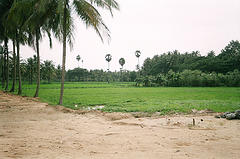Even though you have full ownership of an area of agricultural land, you aren’t permitted to build homes there if the government allows you to. In India, fertile agricultural land could only be used for farming and nothing else, according to the law. The owner must request permission from the relevant authorities and change the “land use” to use it for something different, such as residential, commercial, or industrial use. If you built a home or operated a business on farmland in India, you would engage in illegal activity if this procedure was followed. If you developed a house or operated a business on farmland in India, you would be engaging in criminal activity unless this procedure was followed.
Conversion of the agricultural property process
In India, laws governing land vary from state to state because it is a state subject. To convert your agricultural land to a residential area, you must contact either the revenue department or the planning authority in your city, depending on the state in which you currently reside. Landowners must go to the revenue departments of their towns for the conversion in states like Maharashtra, Karnataka, Rajasthan, and Uttar Pradesh.
For parcels up to 2,500 square meters, the tehsildar in Rajasthan, for instance, could approve the conversion of agricultural land to residential use. On the other hand, developers who want to construct housing projects on agricultural land must obtain permission from the state government (if the total exceeds ceiling areas) or the sub-divisional officer (where the entirety is under 10,000 sq m). In the same way, if the property is required for business purposes, permission from the state government, the collector, and the subdivisional officer must be obtained.
According to Lucknow-based attorney Prabhanshu Mishra, Section 143 of the UP Zamindari Abolition and Land Reforms Act gives the Sub-Divisional Magistrate (SDM) of the area the power to convert agricultural land to residential use.
Fertile land cannot be converted to be used for residential purposes under the laws that are in place in the majority of states. Only parcels of dry or unused land are eligible for conversion. Additionally, a requirement that has been eliminated in many states is that you must be a farmer to purchase agricultural land. In UP, for instance, this was changed in 2014.
Landowners may submit a written request for a change in land use to the commission, the district magistrate, or the collector in states where no authority has given specific permission. The Uttar Pradesh government permitted real estate developers to use productive agricultural land for residential purposes through an amendment to the Zamindari Abolition and Land Reforms Act.
This requirement is no longer necessary in Odisha as well. According to the Odisha Land Reforms Act of 1960, landowners may also change the use of fertile land with the tehsildar’s or sub-collector’s permission.
The commissioner of the land revenue department has the power to approve land conversions in Karnataka. Tehsildars and tax division officers are permitted to consent for this reason in Andhra Pradesh. One may submit a land conversion application online in either of these states.
In Bihar, the sub-divisional officer issues a conversion order.
Landowners may submit a written request for a change of land use to the commission, the district magistrate, or the collector in states where no authority has been given specific permission.
Documents required for the conversion of Agricultural land to residential land
In addition to providing all the information about the relevant land parcel, the applicant for the conversion must submit a lengthy list of supporting documents along with their application, in which they also state the purpose for which they are seeking the land-use change.
The following types of paperwork must be submitted with the application by the applicant:
- Proof of identity
- Deed of sale
- Records of Tenancies and Corps, or RTC
- Deed of partition (if the land was inherited)
- Mutation records
- Study map
- Receipt of land revenue payments, etc.
If any of this paperwork is gone, you can go to the revenue department of your city, which maintains all of these records.
Please be aware that before you apply for the conversion, you must verify that all bills and taxes associated with the land have been paid. For authorization, the property must be free and clear of all legal encumbrances.
How much time and money are involved?
There is a one-time mandatory fee to obtain a certificate of land conversion. This fee varies from state to state, district to district, and locality to locality. For instance, the conversion charge in Andhra Pradesh is three percent of the land value. In Haryana, there is a fee of Rs 210 per square meter to convert public land to residential use.
In Delhi, conversion fees range from Rs 14,328 to Rs 24,777 per square meter for residential use permits, and additional floor area ratios (FAR) have been set at Rs 3,039 to Rs 7,597 per square meter in various industrial areas.
In Rajasthan, the cost to convert an agricultural plot into a residential one ranges from Rs 60 to Rs 200 per square yard. The costs for converting land for commercial use range from Rs 400 to Rs 800 per square yard.
10% of the property’s value must be paid as a conversion fee in Bihar. Note here that the receipt of the payment must be kept safe, as this paper acts as proof that your application has been submitted.
However, it might take a while before the applicant receives the certificate. For instance, Maharashtra’s Land Revenue Code, 1966, stipulates a 90-day window during which the order for conversion must be issued.
The tehsildar must attest to the conversion certificate after the commissioner has issued it.
